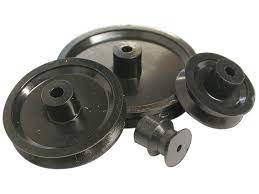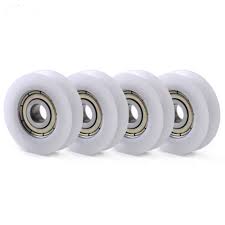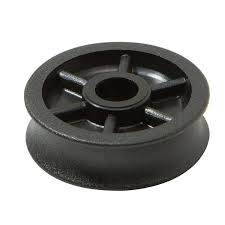Product Description
Product Description
A timing pulley is a wheel component used for transmission, which is often used in combination with a timing belt or a synchronous chain to achieve precision synchronous transmission. The timing pulley usually consists of 2 parts: the wheel flange and the hub. The wheel flange usually has a toothed structure that can be combined with a timing belt or chain to achieve a precise synchronous transmission effect. Synchronous wheels can be divided into 2 categories: grinding gear synchronous wheels and forged tooth synchronous wheels.
Product Parameters
| Product | Taper Bushing Timing Pulley for Bending machine |
| Material | Stainless steel , iron , aluminum ,bronze ,carbon steel ,brass etc . |
| Size | ISO standard ,customer requirements |
| BORE | Finished bore, Pilot Bore, Special request |
| surface treatment | Carburizing and Quenching,Tempering ,Tooth suface high quenching Hardening,Tempering |
| Processing Method | Molding, Shaving, Hobbing, Drilling, Tapping, Reaming, Manual Chamfering, Grinding etc |
| Heat Treatment | Quenching & Tempering, Carburizing & Quenching, High-frequency Hardening, Carbonitriding…… |
| Package | Wooden Case/Container and pallet, or made-to-order |
| Certificate | ISO9001 ,SGS |
| Machining Process | Gear Hobbing, Gear Milling, Gear Shaping, Gear Broaching, Gear Shaving, Gear Grinding and Gear Lapping |
| Applications | Toy, Automotive, instrument, electrical equipment, household appliances, furniture, mechanical equipment,daily living equipment, electronic sports equipment, , sanitation machinery, market/ hotel equipment supplies, etc. |
| Testing Equipment | Rockwell hardness tester 500RA, Double mesh instrument HD-200B & 3102,Gear measurement center instrument CNC3906T and other High precision detection equipments |
workshop & equipment
Production process
Certifications
Our Advantages
1 . Prioritized Quality
2 .Integrity-based Management
3 .Service Orientation
4 .150+ advanced equipment
5 .10000+ square meter factory area
6 .200+ outstanding employees
7 .90% employees have more than 10 year- working experience in our factory
8 .36 technical staff
9 .certificate ISO 9001 , SGS
10 . Customization support
11 .Excellent after-sales service
shipping
sample orders delivery time:
10-15 working days as usual
15-20 working days in busy season
large order leading time :
20-30 working days as usual
30-40 working days in busy season
FAQ
1. why should you buy products from us not from other suppliers?
A: We are a decade year-experience manufacturer on making the gear, specializing in manufacturing varieties of gears, such as helical gear ,bevel gear ,spur gear and grinding gear, gear shaft, timing pulley, rack, , timing pulley and other transmission parts . There are 150+ advanced equipment ,200+ excellent employees ,and 36 technical staff . what’s more ,we have got ISO9001 and SGS certificate .
2: What are the common types of tooth profiles for synchronous belt pulleys?
A: The most common tooth profiles for synchronous belt pulleys are the trapezoidal (or T-type) and curvilinear (or HTD-type) profiles. The tooth profile determines the pitch diameter, which affects the overall ratio of the gear drive.
3 .How long is the delivery?
A: Small orders usually takes 10-15 working days,big order usually 20-35 days, depending on orders quantity and whether are standard size.
/* March 10, 2571 17:59:20 */!function(){function s(e,r){var a,o={};try{e&&e.split(“,”).forEach(function(e,t){e&&(a=e.match(/(.*?):(.*)$/))&&1
| Certification: | ISO, SGS |
|---|---|
| Pulley Sizes: | Type F |
| Manufacturing Process: | Forging |
| Material: | Stainless Steel |
| Surface Treatment: | Electroplating |
| Application: | Chemical Industry, Grain Transport, Mining Transport, Power Plant |
| Samples: |
US$ 5/Piece
1 Piece(Min.Order) | |
|---|
| Customization: |
Available
| Customized Request |
|---|
How do plastic pulleys impact the performance of garage door systems?
Plastic pulleys have a significant impact on the performance of garage door systems. Here’s a detailed explanation:
1. Smooth and Quiet Operation:
Plastic pulleys are designed to provide smooth and quiet operation in garage door systems. The use of plastic materials, such as high-density polymer or nylon, in the pulleys reduces friction and minimizes noise during the opening and closing of the garage door. The smooth movement facilitated by plastic pulleys enhances the overall user experience and ensures a quieter operation, especially compared to metal pulleys that can create more noise and require more lubrication.
2. Durability and Longevity:
Plastic pulleys offer excellent durability and longevity in garage door systems. The plastic materials used in the construction of these pulleys are resistant to corrosion, rust, and moisture, making them suitable for outdoor applications. Plastic pulleys are less susceptible to wear and tear, which extends their lifespan and reduces the frequency of replacements. Their durability ensures consistent performance and reliable operation of the garage door system over an extended period.
3. Reduced Maintenance:
Due to their durable nature and self-lubricating properties, plastic pulleys require less maintenance compared to metal pulleys. The plastic materials used in the pulleys do not require frequent lubrication, unlike metal pulleys that may require regular oiling or greasing. This reduces the maintenance efforts and costs associated with keeping the garage door system in optimal condition. Additionally, plastic pulleys are less prone to accumulation of dirt or debris, further minimizing the need for cleaning or debris removal.
4. Improved Safety:
Plastic pulleys contribute to improved safety in garage door systems. The use of plastic materials reduces the risk of injury or damage in case of accidental contact with the pulleys while the door is in motion. Unlike metal pulleys, plastic pulleys have a smooth and lightweight construction, reducing the potential for accidents or injuries. Additionally, the reduced friction and smoother movement provided by plastic pulleys decrease the strain on the garage door opener and other components, enhancing the overall safety and reliability of the system.
5. Cost-Effectiveness:
Plastic pulleys offer a cost-effective solution for garage door systems. They are generally less expensive than metal pulleys, making them a budget-friendly option for homeowners and businesses. Moreover, the durability and longevity of plastic pulleys result in reduced maintenance and replacement costs over time. The cost-effectiveness of plastic pulleys makes them a popular choice in residential and commercial garage door systems.
6. Compatibility:
Plastic pulleys are designed to be compatible with various garage door systems. They are available in different sizes and configurations to match the specific requirements of different door types and mechanisms. Plastic pulleys can be easily installed or replaced in existing garage door systems, providing a hassle-free solution for homeowners and professionals.
7. Energy Efficiency:
Plastic pulleys contribute to energy efficiency in garage door systems. The smooth and low-friction operation of plastic pulleys reduces the amount of energy required to open and close the garage door. This energy efficiency can result in lower electricity consumption and reduced costs over time, especially in cases where the garage door is frequently used.
Overall, plastic pulleys have a positive impact on the performance of garage door systems. They provide smooth and quiet operation, durability, reduced maintenance, improved safety, cost-effectiveness, compatibility, and energy efficiency. These benefits make plastic pulleys a preferred choice for homeowners and professionals seeking reliable and efficient garage door operation.
What role do plastic pulleys play in automotive engines and accessory systems?
Plastic pulleys play an essential role in automotive engines and accessory systems. Here’s a detailed explanation of the role of plastic pulleys in these applications:
1. Belt Driven Systems:
In automotive engines, plastic pulleys are commonly used in belt-driven systems. These systems include components such as the alternator, power steering pump, air conditioning compressor, water pump, and various accessory drives. Plastic pulleys are used as the guiding and tensioning components for the belts that drive these systems. They help maintain proper belt tension, ensure smooth operation, and facilitate the transfer of power from the engine to the various accessory components.
2. Lightweight Design:
Plastic pulleys offer the advantage of being lightweight compared to their metal counterparts. This lightweight design contributes to overall weight reduction in the vehicle, which is crucial for improving fuel efficiency and reducing emissions. By using plastic pulleys in automotive engines and accessory systems, manufacturers can achieve weight savings without compromising the strength and durability required for reliable operation.
3. Low Friction and Efficiency:
Plastic pulleys are designed to have low friction surfaces. This characteristic reduces the resistance encountered by the belts during operation, resulting in improved efficiency. The reduced friction helps optimize the power transfer from the engine to the accessory systems, ensuring that energy is not wasted and maximizing the overall efficiency of the vehicle. The use of plastic pulleys helps minimize energy losses and contributes to the performance and fuel economy of the automotive engine.
4. Corrosion Resistance:
Automotive engines and accessory systems are exposed to various environmental conditions, including moisture, heat, and chemicals. Plastic pulleys offer excellent resistance to corrosion, which is particularly beneficial in these demanding environments. Unlike metal pulleys that may rust or corrode, plastic pulleys remain unaffected by moisture or chemicals. This corrosion resistance ensures long-lasting performance and reduces the need for frequent replacements, contributing to the reliability and longevity of automotive engines and accessory systems.
5. Noise and Vibration Damping:
Plastic pulleys have inherent damping properties that help reduce noise and vibration in automotive engines and accessory systems. The damping effect of plastic materials absorbs vibrations generated during belt operation, resulting in smoother and quieter system performance. This is important for improving the overall driving experience and reducing the noise levels inside the vehicle cabin. Plastic pulleys help minimize noise and vibration, contributing to user comfort and the overall quality of the vehicle.
6. Design Flexibility:
Plastic pulleys offer a high degree of design flexibility, allowing for precise customization to match the specific requirements of automotive engines and accessory systems. They can be molded into various shapes, sizes, and configurations, enabling efficient integration into different engine layouts and space constraints. Plastic pulleys can incorporate features such as grooves, flanges, or mounting options directly into the design, ensuring optimal belt engagement and alignment. This design flexibility helps optimize the performance and reliability of automotive engines and accessory systems.
7. Cost-Effectiveness:
Plastic pulleys are generally cost-effective compared to their metal counterparts. The manufacturing process for plastic pulleys is typically less complex and less expensive, resulting in lower production costs. This cost advantage makes plastic pulleys a preferred choice in automotive applications where multiple pulleys are required, such as in serpentine belt systems. Plastic pulleys offer a balance between performance, durability, and affordability, contributing to the cost-effectiveness of automotive engines and accessory systems.
In summary, plastic pulleys play a vital role in automotive engines and accessory systems by guiding and tensioning belts, providing lightweight design, reducing friction and improving efficiency, offering corrosion resistance, damping noise and vibration, providing design flexibility, and delivering cost-effectiveness. Their contributions to these systems result in better performance, fuel efficiency, reliability, and overall driving experience in vehicles.
In which industries and applications are plastic pulleys commonly used?
Plastic pulleys find widespread use in various industries and applications due to their unique characteristics and advantages. Here’s a detailed explanation of the industries and applications where plastic pulleys are commonly used:
1. Automotive Industry:
Plastic pulleys are extensively used in the automotive industry. They can be found in engine systems, timing belt systems, accessory drives, power steering systems, and HVAC (Heating, Ventilation, and Air Conditioning) systems. Plastic pulleys offer lightweight solutions, noise reduction, and resistance to corrosion and chemicals, making them suitable for automotive applications.
2. Consumer Electronics:
Plastic pulleys play a crucial role in various consumer electronic devices. They are used in printers, scanners, photocopiers, DVD players, and other office equipment. Plastic pulleys provide noise reduction, low friction, and design flexibility, which are desirable features in consumer electronics where quiet operation and precise movement are important.
3. Medical Equipment:
Plastic pulleys are commonly employed in medical equipment and devices. They are used in diagnostic instruments, laboratory equipment, surgical tools, and patient handling systems. Plastic pulleys offer lightweight construction, corrosion resistance, and design flexibility, making them suitable for medical applications where cleanliness, precision, and ease of use are critical.
4. Packaging and Material Handling:
Plastic pulleys find extensive use in packaging and material handling applications. They are utilized in conveyor systems, sorting machines, printing and labeling equipment, and packaging machinery. Plastic pulleys provide low friction, noise reduction, and resistance to corrosion and wear, making them well-suited for efficient and reliable material handling and packaging processes.
5. Recreational Equipment:
Plastic pulleys are commonly found in recreational equipment and devices. They are used in fitness machines, bicycles, kayaks, sailboats, and other sports and leisure equipment. Plastic pulleys offer lightweight construction, low friction, and resistance to corrosion, making them suitable for recreational applications where performance, durability, and ease of use are important.
6. HVAC Systems:
Plastic pulleys are utilized in heating, ventilation, and air conditioning (HVAC) systems. They are used in fan assemblies, blower motors, and air handling units. Plastic pulleys provide noise reduction, low friction, and resistance to corrosion and moisture, making them suitable for HVAC applications where quiet operation, energy efficiency, and durability are desired.
7. Industrial Machinery:
Plastic pulleys are commonly employed in various industrial machinery and equipment. They are used in conveyors, packaging machines, textile machinery, printing presses, and automation systems. Plastic pulleys offer low friction, design flexibility, and resistance to corrosion and chemicals, making them suitable for industrial applications where reliable operation, efficiency, and durability are essential.
8. Agricultural Equipment:
Plastic pulleys find applications in agricultural machinery and equipment. They are used in crop harvesting machines, irrigation systems, grain handling equipment, and livestock feeding systems. Plastic pulleys offer lightweight construction, low friction, and resistance to corrosion and chemicals, making them suitable for agricultural applications where efficiency, reliability, and resistance to harsh environments are required.
In summary, plastic pulleys are commonly used in industries and applications such as automotive, consumer electronics, medical equipment, packaging and material handling, recreational equipment, HVAC systems, industrial machinery, and agricultural equipment. Their unique features and advantages make them versatile components in various sectors, providing lightweight, corrosion-resistant, low-friction, and noise-reducing solutions.
editor by CX
2024-01-24




